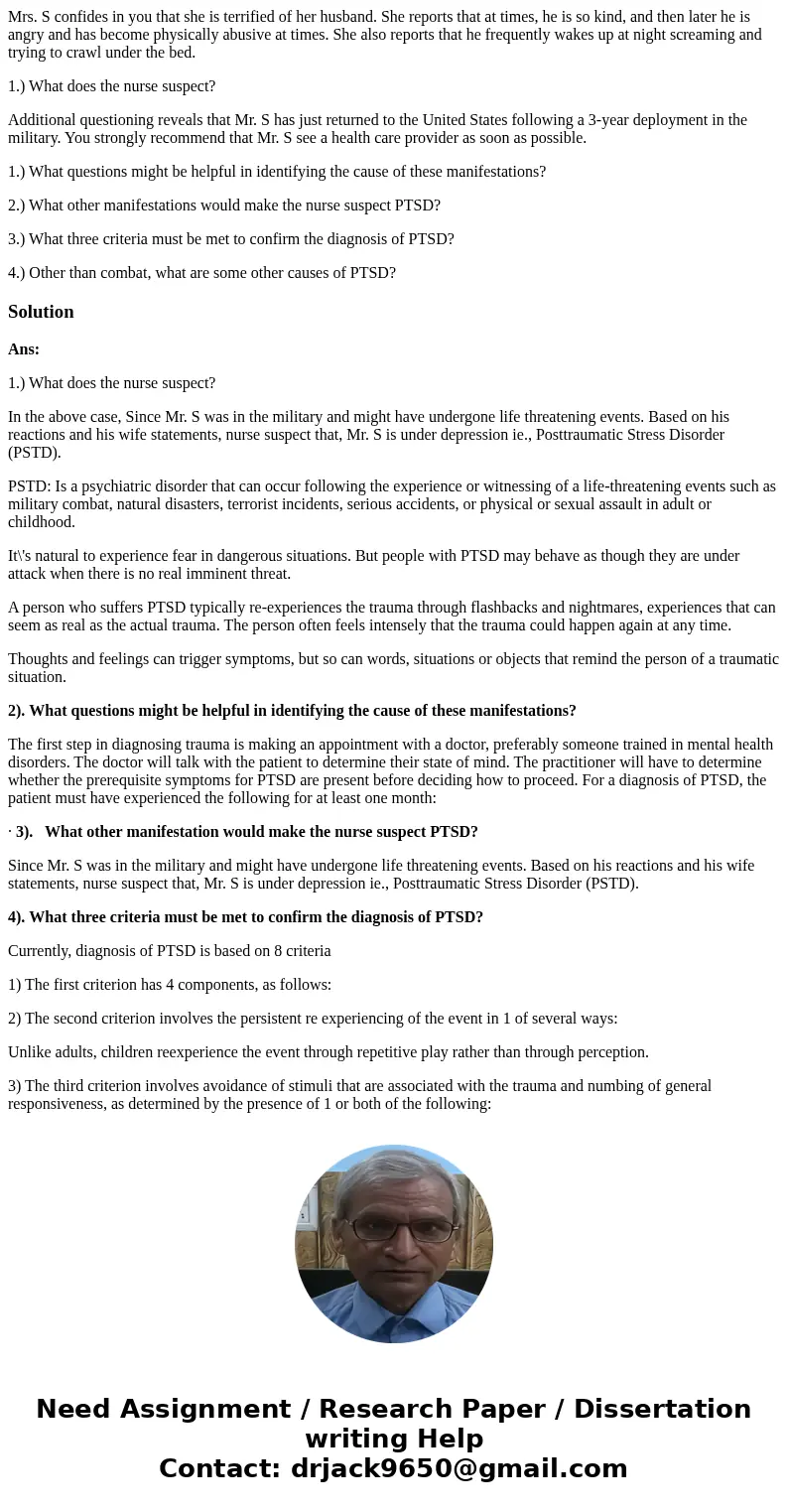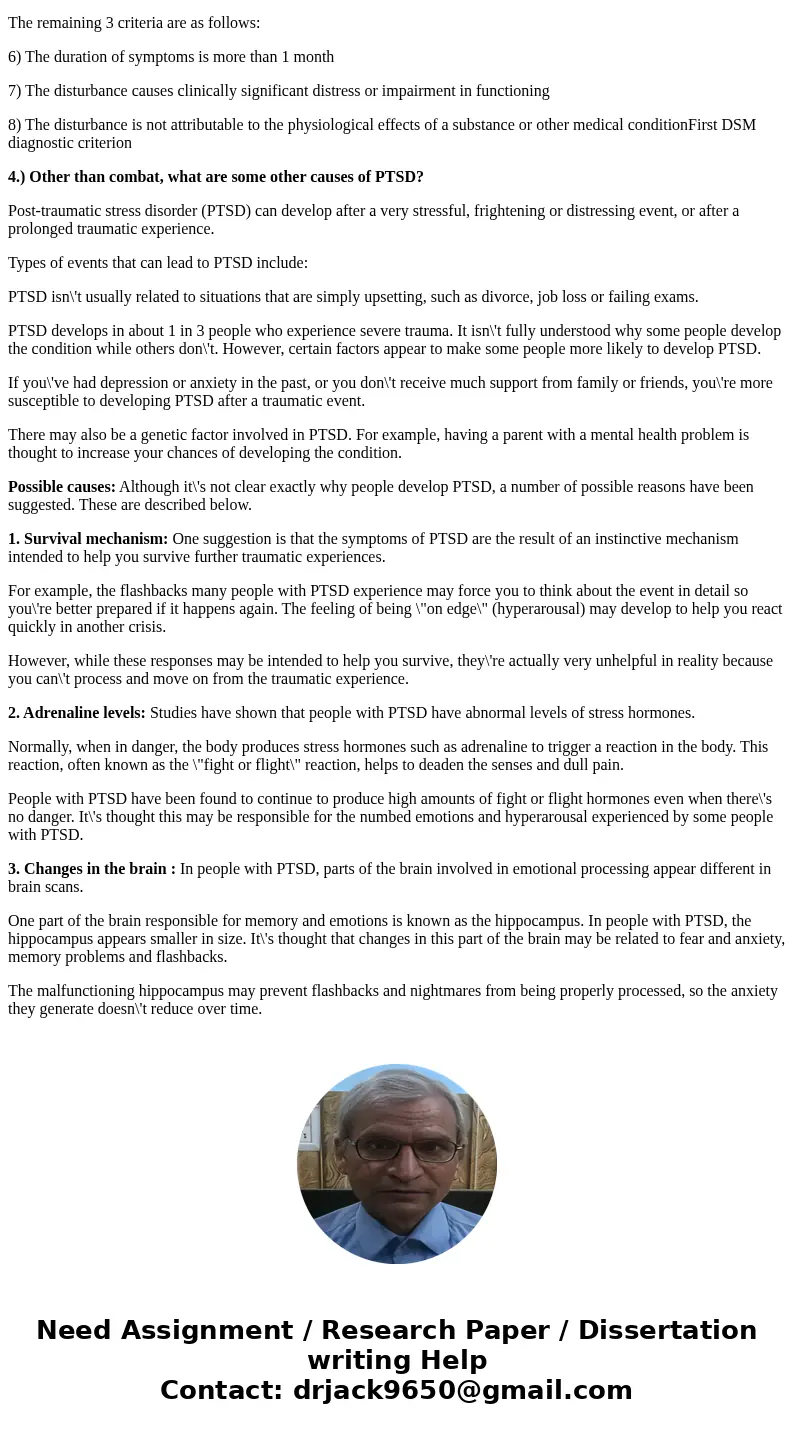Mrs S confides in you that she is terrified of her husband S
Mrs. S confides in you that she is terrified of her husband. She reports that at times, he is so kind, and then later he is angry and has become physically abusive at times. She also reports that he frequently wakes up at night screaming and trying to crawl under the bed.
1.) What does the nurse suspect?
Additional questioning reveals that Mr. S has just returned to the United States following a 3-year deployment in the military. You strongly recommend that Mr. S see a health care provider as soon as possible.
1.) What questions might be helpful in identifying the cause of these manifestations?
2.) What other manifestations would make the nurse suspect PTSD?
3.) What three criteria must be met to confirm the diagnosis of PTSD?
4.) Other than combat, what are some other causes of PTSD?
Solution
Ans:
1.) What does the nurse suspect?
In the above case, Since Mr. S was in the military and might have undergone life threatening events. Based on his reactions and his wife statements, nurse suspect that, Mr. S is under depression ie., Posttraumatic Stress Disorder (PSTD).
PSTD: Is a psychiatric disorder that can occur following the experience or witnessing of a life-threatening events such as military combat, natural disasters, terrorist incidents, serious accidents, or physical or sexual assault in adult or childhood.
It\'s natural to experience fear in dangerous situations. But people with PTSD may behave as though they are under attack when there is no real imminent threat.
A person who suffers PTSD typically re-experiences the trauma through flashbacks and nightmares, experiences that can seem as real as the actual trauma. The person often feels intensely that the trauma could happen again at any time.
Thoughts and feelings can trigger symptoms, but so can words, situations or objects that remind the person of a traumatic situation.
2). What questions might be helpful in identifying the cause of these manifestations?
The first step in diagnosing trauma is making an appointment with a doctor, preferably someone trained in mental health disorders. The doctor will talk with the patient to determine their state of mind. The practitioner will have to determine whether the prerequisite symptoms for PTSD are present before deciding how to proceed. For a diagnosis of PTSD, the patient must have experienced the following for at least one month:
· 3). What other manifestation would make the nurse suspect PTSD?
Since Mr. S was in the military and might have undergone life threatening events. Based on his reactions and his wife statements, nurse suspect that, Mr. S is under depression ie., Posttraumatic Stress Disorder (PSTD).
4). What three criteria must be met to confirm the diagnosis of PTSD?
Currently, diagnosis of PTSD is based on 8 criteria
1) The first criterion has 4 components, as follows:
2) The second criterion involves the persistent re experiencing of the event in 1 of several ways:
Unlike adults, children reexperience the event through repetitive play rather than through perception.
3) The third criterion involves avoidance of stimuli that are associated with the trauma and numbing of general responsiveness, as determined by the presence of 1 or both of the following:
The remaining 3 criteria are as follows:
6) The duration of symptoms is more than 1 month
7) The disturbance causes clinically significant distress or impairment in functioning
8) The disturbance is not attributable to the physiological effects of a substance or other medical conditionFirst DSM diagnostic criterion
4.) Other than combat, what are some other causes of PTSD?
Post-traumatic stress disorder (PTSD) can develop after a very stressful, frightening or distressing event, or after a prolonged traumatic experience.
Types of events that can lead to PTSD include:
PTSD isn\'t usually related to situations that are simply upsetting, such as divorce, job loss or failing exams.
PTSD develops in about 1 in 3 people who experience severe trauma. It isn\'t fully understood why some people develop the condition while others don\'t. However, certain factors appear to make some people more likely to develop PTSD.
If you\'ve had depression or anxiety in the past, or you don\'t receive much support from family or friends, you\'re more susceptible to developing PTSD after a traumatic event.
There may also be a genetic factor involved in PTSD. For example, having a parent with a mental health problem is thought to increase your chances of developing the condition.
Possible causes: Although it\'s not clear exactly why people develop PTSD, a number of possible reasons have been suggested. These are described below.
1. Survival mechanism: One suggestion is that the symptoms of PTSD are the result of an instinctive mechanism intended to help you survive further traumatic experiences.
For example, the flashbacks many people with PTSD experience may force you to think about the event in detail so you\'re better prepared if it happens again. The feeling of being \"on edge\" (hyperarousal) may develop to help you react quickly in another crisis.
However, while these responses may be intended to help you survive, they\'re actually very unhelpful in reality because you can\'t process and move on from the traumatic experience.
2. Adrenaline levels: Studies have shown that people with PTSD have abnormal levels of stress hormones.
Normally, when in danger, the body produces stress hormones such as adrenaline to trigger a reaction in the body. This reaction, often known as the \"fight or flight\" reaction, helps to deaden the senses and dull pain.
People with PTSD have been found to continue to produce high amounts of fight or flight hormones even when there\'s no danger. It\'s thought this may be responsible for the numbed emotions and hyperarousal experienced by some people with PTSD.
3. Changes in the brain : In people with PTSD, parts of the brain involved in emotional processing appear different in brain scans.
One part of the brain responsible for memory and emotions is known as the hippocampus. In people with PTSD, the hippocampus appears smaller in size. It\'s thought that changes in this part of the brain may be related to fear and anxiety, memory problems and flashbacks.
The malfunctioning hippocampus may prevent flashbacks and nightmares from being properly processed, so the anxiety they generate doesn\'t reduce over time.


 Homework Sourse
Homework Sourse